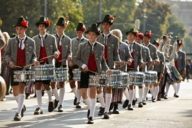
Tradition and customs in Munich are more fashionable than ever before. From fresh approaches in fashion to exciting experiments in the kitchen: an overview.
Traditional costumes and folk music are more fashionable in Munich than ever before. Especially with young Munichers, the Oktoberfest and Dulten (traditional markets) are cult. Young bands bring new "folk music" to the clubs and celebrate their successes outside Munich.
Not only is there experimentation in fashion and music, the kitchen also likes to combine the finest of grandma's recipes with delicacies from all over the world. Even in the beer garden barley juice and pretzels are eaten with Italian antipasti, spring rolls, falafel or other international specialities. Enjoy your meal!
Leather pants and dirndl are not commonplace in Munich either. Those who walk out of Marienplatz during the week in traditional costume on the S-Bahn will catch a glimpse. In the Wiesn period, however, everyone brings out their traditional costume at the Oktoberfest, because people like to wear traditional costumes. Especially the young visitors got a taste for it. There are also other occasions when traditional garments can be worn: Spring festival or Kocherlball, but also the different club evenings, which are under motti like "Night of the Tracht" or "Heimatabend".
Only one thing has always been the case: leather pants are the most beautiful when they already have patina. Connoisseurs will find well-registered specimens at flea markets or from specialists.
There are shops specializing in traditional costumes all over the city. Before and during the Oktoberfest, even in trendy boutiques and large clothing stores, space is created for dirndl and leather trousers, and it open pop-up costume stores. Dirndl also belongs to the collections of young Munich designers. Cross over is often the motto of her creations, which, with African fabrics, Chinese silk or quotes from Indian saris, are elegant, fashionable and at the same time tradition-conscious, constitute the traditional costume of the 21st century. Only one thing has always been the case: leather pants are the most beautiful when they already have patina. Connoisseurs will find well-registered specimens at flea markets or from specialists.
In many of Munich's traditional pubs, music is made in the same way as in older times (for example, in the Schneider Bräuhaus, Hofbräuhaus, Löwenbräukeller, Turmstüberl). Folk music artists perform on stage, and not infrequently guests sing and play music themselves.
Parallel to traditional folk music, young musicians have developed new styles from it. Folk music is mixed with sounds from other countries, with techno beats and lyrics that tell stories of today. The Bavarian band "Brass Banda" even fills the Munich Olympiahalle with tuba and brass music. As with "Zwirbeldirn" and "Kofelgschroa", she began her stage career at the Folk Music Days in the Munich Wirtshaus Fraunhofer. Every year you can experience new musical delicacies of the young "folk music".
In Bavaria, body and soul are always delighted by culinary delights: roast pork, dumplings, white sausages, liver cheese and Bavarian cuisine can be found in all traditional restaurants. Beer garden specialities include Obazda, an urban Bavarian cheese speciality, fresh Radi (Rettich) and pretzels. In the picnic basket you will find everything your heart desires and that is often very international.
Many Munich restaurants are also breaking new ground, combining international cuisine with Bavarian coziness (and Bavarian beer). In some dishes, Bavarian and international cuisines merge with Japanese mayonnaise or Bavarian tapas in roast suckling pigs, for example.